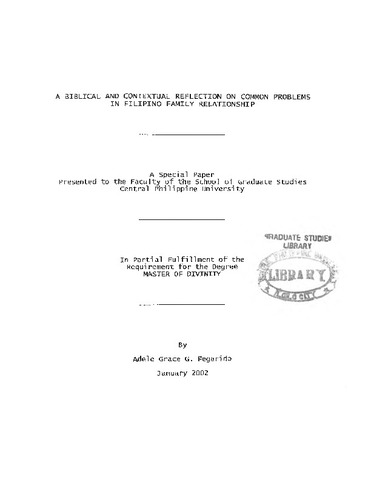A biblical and contextual reflection on common problems in Filipino family relationship
| dc.contributor.adviser | Fabula, Nathaniel M. | |
| dc.contributor.author | Fegarido, Adele Grace G. | |
| dc.date.accessioned | 2022-05-02T00:39:38Z | |
| dc.date.available | 2022-05-02T00:39:38Z | |
| dc.date.issued | 2002 | |
| dc.identifier.citation | Fegarido, A. G. G. (2002). A biblical and contextual reflection on common problems in Filipino family relationship (Unpublished Master’s special paper). Central Philippine University, Jaro, Iloilo City. | en_US |
| dc.identifier.uri | https://hdl.handle.net/20.500.12852/2044 | |
| dc.description | Introduction | en_US |
| dc.description.abstract | Seeing many families crumble is alarming in the sense that the family is considered not only as the smallest unit but also a significant part of a society and as a saying goes, “the strength of the chain depends upon the strength of the weakest link.” If family relationships are unhealthy then there is no promise of a better society since the supra-community is also made up of struggling and weak families. The Filipino family is confronted with various pressures in our time. Some families have suffered disintegration as consequence of such pressures. Significant pressures include the following: the financial difficulties at home and job opportunities abroad forced many spouses to leave their families for “greener pasture”. This resulted to the emergence of “long-distance marriages” that had affected the marital relationship as well as the children. Women at present share equal educational opportunities for advancement with men so that they have become more competent in occupying better positions in the work places. Women who were traditionally expected to stay at home and take care of the kids, now work and earn. It is quite difficult for some men to accept that their wives earn more than they do. There is also the present threat on family headship. Traditionally, the father is recognized as head of the family. Now, it is challenged by egalitarian form of leadership. It means both the husband and wife share in the family leadership. Another reality that is disturbing to family relationship is the loyalty dilemma between any of the spouse and the in-laws. Up to what extent should a son be attached to his mother? Should in-laws be outlawed in a marital relationship? To what extent should a mother or father have the right to intervene with their children’s family? Children and women are now granted legal rights. Before, they cannot complain even if they are domestically abused and maltreated. Now their human rights are recognized and are protected by the government. They can now assert for what they think is due them. These changes have become pressures to the family. Some families have gradually adapted to these changes while others because of rigidity have resisted any kind of shift in the family system. With this in mind, this paper focuses on the issue of family and its accompanying problems on relationships. This study will convey valuable reflections based on research and observation, taking into consideration the teachings of the Scriptures and the lessons learned from the Philippine context in confronting these problems. This study assesses selected Filipino problems on relationships in the light of Biblical teachings and explores practical guidelines for families and individuals in confronting conflict situations. Moreover, the involvement of the Church, being a venue where individuals and families are healed, strengthened and empowered through its ministry to the family, i.e. promoting wellness to families will be analyzed. This paper hopes to provide information to those who have committed themselves to marriage and family life as well as those who are still contemplating to enlist themselves, and for those who have decided not to venture on marriage life at all. | en_US |
| dc.format.extent | 89 leaves | en_US |
| dc.language.iso | en | en_US |
| dc.subject.ddc | TheoLib Thesis 200.72 F321 | en_US |
| dc.subject.lcsh | Families | en_US |
| dc.subject.lcsh | Filipinos | en_US |
| dc.subject.lcsh | Filipinos--Family relationships | en_US |
| dc.subject.lcsh | Families--Biblical teaching | en_US |
| dc.title | A biblical and contextual reflection on common problems in Filipino family relationship | en_US |
| dc.type | Special paper | en_US |
| dcterms.accessRights | Not publicly accessible | en_US |
| dc.description.bibliographicalreferences | Includes bibliographical references | en_US |
| dc.contributor.chair | David, Fely P. | |
| dc.contributor.department | School of Graduate Studies | en_US |
| dc.description.degree | Master of Divinity | en_US |
이 항목의 파일
This item appears in the following Collection(s)
-
Master of Divinity [36]


